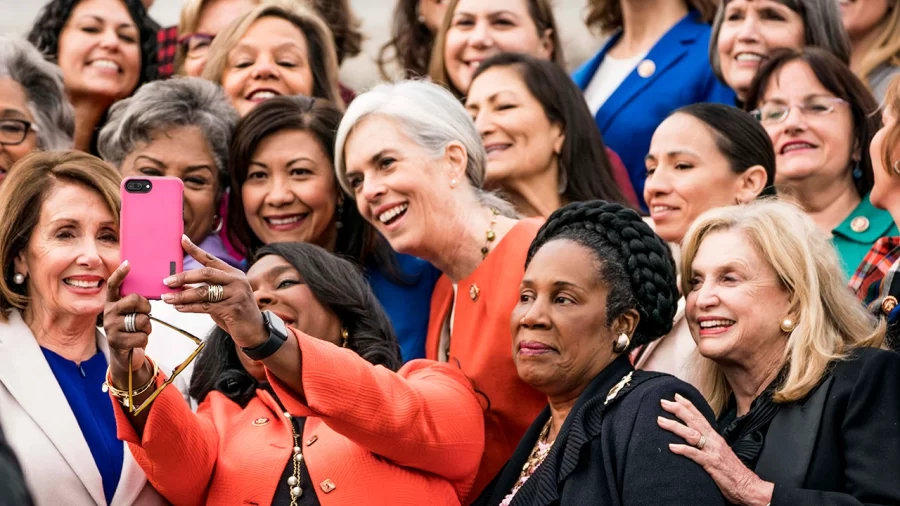Congress continues to need more minority representation
May 30, 2022
Although the 117th Congress is diverse, Congress still does not adequately represent american citizens
America is incredibly diverse in regards to its demographics. However, you would not know this when looking at the 113th Congress, which served from 2013 to 2014. In fact, the 113th Congresss had the first gay senator, Hindu representative, Buddhist representative, as well as a record number of women. Still, the 113th Congress did not reflect America; around 14% of the American population at the time identified as African American, although only one out of every ten Congressional members did.
Across the board, this was the same for the many groups of people in the country. While the racial and ethnic diversity of Congress has improved in recent years, it is not reflective of the incredible melting pot we call America. White people continue to dominate politics, which does not make sense in a democratic country with a sundry of demographics. That’s exactly why it’s so important we elect more minorities, especially with midterms around the corner.
The disproportionate discourse of American political representation is quite shocking. More than two thirds of all American political positions are held by white men, even though they total about 30% of the nation’s population. On the flip side, there are far more women and people of color than men throughout America, which is why a government dominated by white males, who are most oftenly Christian, seems surreal. Brenda Choresi Carter, the director of the Reflective Democracy Campaign describes it perfectly:
“I think if we saw these numbers in another country, we would say there is something very wrong with that political system.”
Yet it’s not just population reflection that makes Congressional and political diversity incredibly important. People’s experiences and backgrounds can influence legislation and ensure a more just America. The equation is rather simple: by increasing the number of people from minority groups in political offices, the perspective represented in the halls of power is less limited to the confines of one group of people.
That’s not to say that breaking through the current legislative cycle in place that continuously places white, Christian male individuals into power is easy. According to The Guardian, incumbents enjoy huge advantages, and the Republican party in particular focuses mainly on white candidates. Both of these factors strengthen the aforementioned cycle, and prevent proper American representation in politics.
Last November, for example, almost 100% of Congressional incumbents won re-election, which, also according to The Guardian “suggests that officeholders who win their primaries benefit from a similar edge during the general election.” In regards to the other factor, the Republican Party nominated almost 100% male candidates, 25% of which were women.
Disregarding the cycle, right now, a quarter of America’s senators and representatives identify as a part of an ethinic or racial minority. Without fair representation of all people, however, commonsense policies and legislation supported by the majority of Americans struggle to make progress. Carter thinks that electing more minorities will provide America with the perspective we need to get critical legislation passed, especially regarding important topics: gun control, universal benefits and voting registration and suppression. As a representative democracy, having a government that is actually representative of the people is crucial. Otherwise, what the government does is represent a small minority group (such as wealthy, white, Christian men) and produce legislation to benefit that same group. This can be seen playing out in a number of policy situations — less than ten percent of Americans say marijuana should be completely illegal, and yet that is federal law; around 60 percent of Americans say abortion should be legal in all or most cases, and yet the government (namely Republicans and the conservative leaning Supreme Court) seems to be working its hardest to do away with Roe v. Wade; two thirds of Americans think the government should be doing more to fight climate changes–in fact there is bipartisan support for several major environmental policies–and yet politicians in Congress squabble over these exact policies (and this happens too in the executive branch, Secretary of Transportation Pete Buttigieg allocated funding for an airport to be built on Bell Bowl Prairie in Illinois, one of the last remaining prairies in Illinois and home to scores of endangered animals). These policies benefit the poor, women, and other disenfranchised groups. They do also benefit the wealthy, white, Christian men in Congress because, to paraphrase Maya Angelou, none of us are truly free until all of us are free.
With each Congress, America sees new breakthroughs in political diversity. Currently, Congress has record numbers of Black, Hispanic, Asian/Pacific Islander and Native American representatives, according to Pew Research. We have still never had a Black female governor or Supreme Court Justice, and many major political offices have historically never been held by a member of the other minorities in the United States.
We have a long way to go, in terms of representing the American people in political offices. Each election provides a stepping stone for change, though, and allows us to ensure that the American melting pot of diversity has enough space for every ingredient. By grabbing the ladle together, and stirring things up, we can utilize elections to get more minorities into power and thereby make the United States a freer, more equitable, and all around better place to live. And this is just the first step! Elements of our society are set up as ways to systemically discriminate and marginalize different groups of people. Changing the composition of the government is a step towards systemically changing the way our country functions and thinks.
